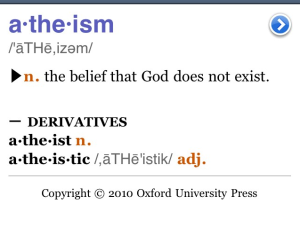When we talk to atheists, they will often say that they refuse to provide any sort of evidence against God’s existence. They will say that they do not have any burden of proof, and that atheism is just a default position. Therefore they have no need to provide any sort of evidence. However, it is my position that this is just a sign of cowardice. Atheists do not provide any evidence, despite that they need to provide evidence. There are at least 5 reasons we shouldn’t believe atheists unless they can disprove God’s existence.
1 – Atheism is a claim.
 When I say that atheism is a claim, I mean that it makes specific claims about reality. Traditionally, philosophers have acknowledged the following paradigm: theism is the view that God exists; agnosticism is the view that the existence of God is unknown or unknowable, and atheism is so defined as the view that God does not exist. As such, theism and atheism bear a burden of proof. They are claiming, either, “God does not exist,” or “God does exist.” Both positions need to be able to provide some reasons.
When I say that atheism is a claim, I mean that it makes specific claims about reality. Traditionally, philosophers have acknowledged the following paradigm: theism is the view that God exists; agnosticism is the view that the existence of God is unknown or unknowable, and atheism is so defined as the view that God does not exist. As such, theism and atheism bear a burden of proof. They are claiming, either, “God does not exist,” or “God does exist.” Both positions need to be able to provide some reasons.
The problem is that many atheists do not have any reasons for their position. So, instead, they have revised the definition of atheism, so that it is no longer the position that God does not exist. Now, it is just a synonym for agnosticism. Obviously agnosticism is neither true nor false, because it does not make any claims. But according to the Oxford Dictionary of Philosophy, atheism is the view that there is no God. Therefore, atheism makes claims, and we should not believe them unless they can provide some evidence.
2 – Atheism contradicts what we can see plainly.
Most Christians, when asked to justify their belief in God, appeal to their personal experience of the living Lord. They know God as though he were another person in their lives. This is what philosophers would regard as a properly basic belief. A properly basic belief is one that we can just see plainly as we begin to cognitize. For instance, we all recognize that there are actual other people around us. We are all rational to believe that we are not hallucinating these people. These are properly basic beliefs.
If the atheist is to persuade us that our intuitions about the reality of the physical world are false, they need to be able to give some reasons. If someone wants to convince us that we really are hallucinating, they need to be able to provide some evidence. Just because hallucinations exist does not mean that we ought to constantly be on the lookout for hallucinations. If someone wants to persuade you that you are hallucinating your wife, just because hallucinations exist, they must be able to provide some evidence. It just contradicts what we can see plainly. So the same with belief in the existence of God. If the atheist wants to persuade us to contradict what our senses reveal to us, they have to be able to provide some evidence.
3 – Atheists are so passionate about evidence.
Even in the face of overwhelming evidence, atheists are constantly demanding more and more, as though there were a threshold of evidence that they just keep raising and raising as they deem it appropriate. It seems as though any amount of evidence and argumentation will not convince atheists. They are constantly asking for more. It is almost as though their heads are in the sand. So, since they are so passionate about evidence, why the double-standard?
If an atheist is so passionate about evidence for the existence of God, on the one hand, then why are they so dismissive about their need for evidence? They will often say things such as, “God is myth,” or “there is no God.” But these claims become logically unsustainable if there is no evidence for them. So, atheists need to be able to provide some evidence for their radical views.
4 – It is possible to prove a negative.
When I say that it is possible to prove a negative, I mean that it is possible to prove that some things do not exist. This is in contrast with the common atheist slogan that it is impossible to prove a negative. Despite its’ popularity, this claim is specious. It is easy to prove a universal negative. For instance, we know that there are no square circles. The idea of a square circle is logically absurd, and therefore it could not exist.
Since it is possible to prove a universal negative, and the claim, “God does not exist,” is a universal negative, it follows that, if true, it is possible to prove the claim, “God does not exist.” If God did not exist, there should be no reason that atheists would not be able to show that he did not exist. But they cannot. There are no arguments that can be successfully mounted against the existence of God.
5 – Negating the evidence in favor of God’s existence.
 When atheists claim that there is no evidence in favor of God’s existence, they are really speaking out of their own desires. What they really mean is, “I do not want there to be any evidence. It makes my atheism very uncomfortable.” This is because there is evidence in favor of God’s existence. There are a number of elements of the universe which are best explained by the existence of God, namely: the existence of the universe, the origin of the universe, the fine-tuning of the cosmos, the design of the DNA molecule, and the resurrection of Jesus of Nazareth. I explained these more in my article 5 Reasons Atheism Is Stupid.
When atheists claim that there is no evidence in favor of God’s existence, they are really speaking out of their own desires. What they really mean is, “I do not want there to be any evidence. It makes my atheism very uncomfortable.” This is because there is evidence in favor of God’s existence. There are a number of elements of the universe which are best explained by the existence of God, namely: the existence of the universe, the origin of the universe, the fine-tuning of the cosmos, the design of the DNA molecule, and the resurrection of Jesus of Nazareth. I explained these more in my article 5 Reasons Atheism Is Stupid.
Since there is a sound case for the existence of God, atheists need an equally or more sound case against the existence of God. If they want to persuade us, they need to be just as, if not more persuasive than the theist case. They cannot just sit on their hands and recite slogans. They have to be engaging and provide some evidence.
Do atheists usually tell you that they do not need evidence? Leave a comment!
If you would like to get in on the discussion about this, join my Theology Discussion Group!